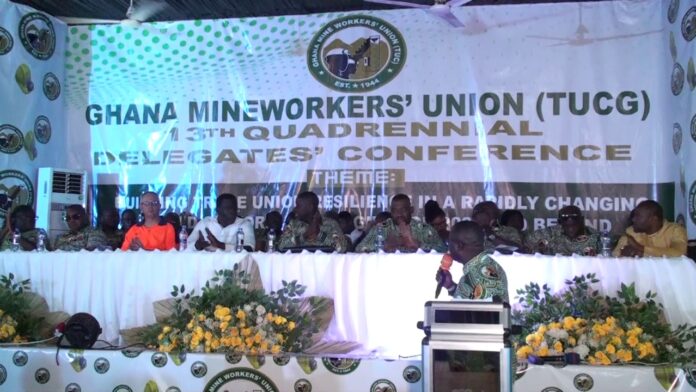The Ghana Mines Workers Union (GMWU) says the shift from permanent employment to non-standard forms of employment –including temporary work, casualisation, fixed term contract work –in the mining sector is causing job insecurity.
A study conducted by the Union indicated that about 90 per cent of the workforce in the mining sector are currently engaged in non-standard forms of employment with standard employment sitting just at 10 per cent.
Speaking at the Union’s 13th quadrennial delegates conference at Obuasi, General Secretary of GMWU Abdul-Moomin Gbana said the development has led to “lower levels of employment protection and high degree of uncertainty.”

“There has been a surge in workers and trade Union rights violation, a shrinking collectively bargaining coverage, job insecurity, threatening social protection cover, and fluctuation in income and pensions,” he added.
The Union observed that while businesses get rid of previous commitments to employees, they tend to hire same skilled employees under highly unfavorable terms and conditions.
“Regrettably, this phenomenon continues to be exacerbated by the wanton fragmentation of production and outsourcing arrangements by mining companies resulting in the further fragmentation of work, the rise of non-standard forms of employment, and the further individualization of labour and employment relations,” Mr Gbana asserted.
The rise of non-standard forms of employment and the increasing informality of the Ghanaian economy has been blamed on Ghana’s weak labour legislation
“In fact barely two years ago when Newmont Gold Ghana Limited decided to embark on their rather controversial new employment model of switching permanent jobs to contracts of a fixed duration or what we loosely refer to as fixed term contract employment, the Management of Newmont was asked why they took that decision and quite interestingly, their answer was that “Ghana’s labour law allows them to do it,” the General Secretary of the mine workers stated.
GMWU is thus calling on stakeholders within the industrial relations space to engage in finding ways to curtail this disturbing situation and ensure employment protection for workers in the mining sector.
The Minister of Employment and Labour Relations, Ignatius Baffuor Awuah admitted that the country’s Labour Act needs to be amended.

“We will have to subject it to thorough discussion so we ensure no employer or employee use the loophole to cheat the other,” he assured.
The delegates conference created the platform for the mine workers to deliberate on matters of interest and come out with effective strategies that would help them respond to the rapidly changing world of work.
READ ALSO: Poor leadership reason for teeming unemployment in Africa – Security expert
By Ibrahim Abubakar|AkomaFM|Onuaonline.com












